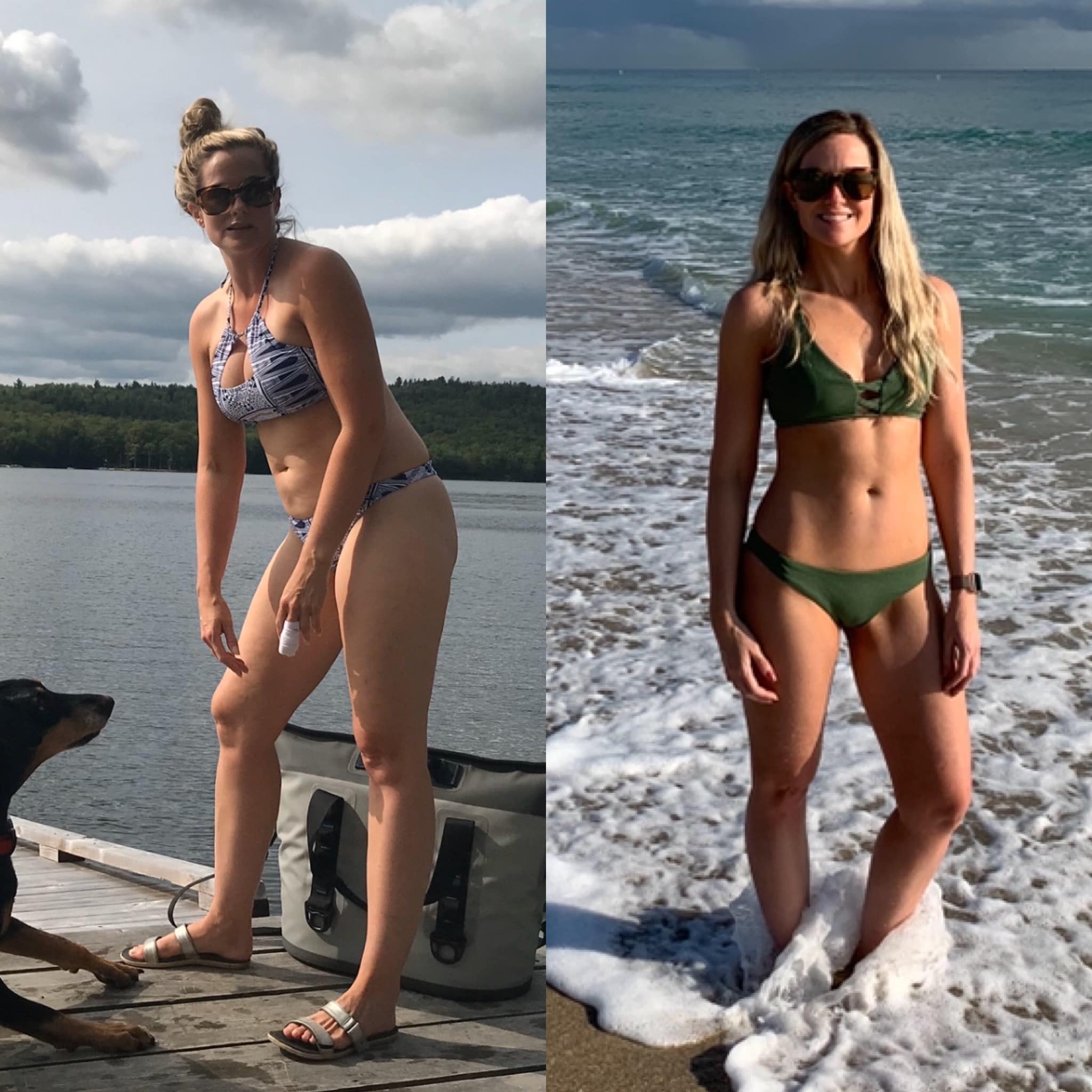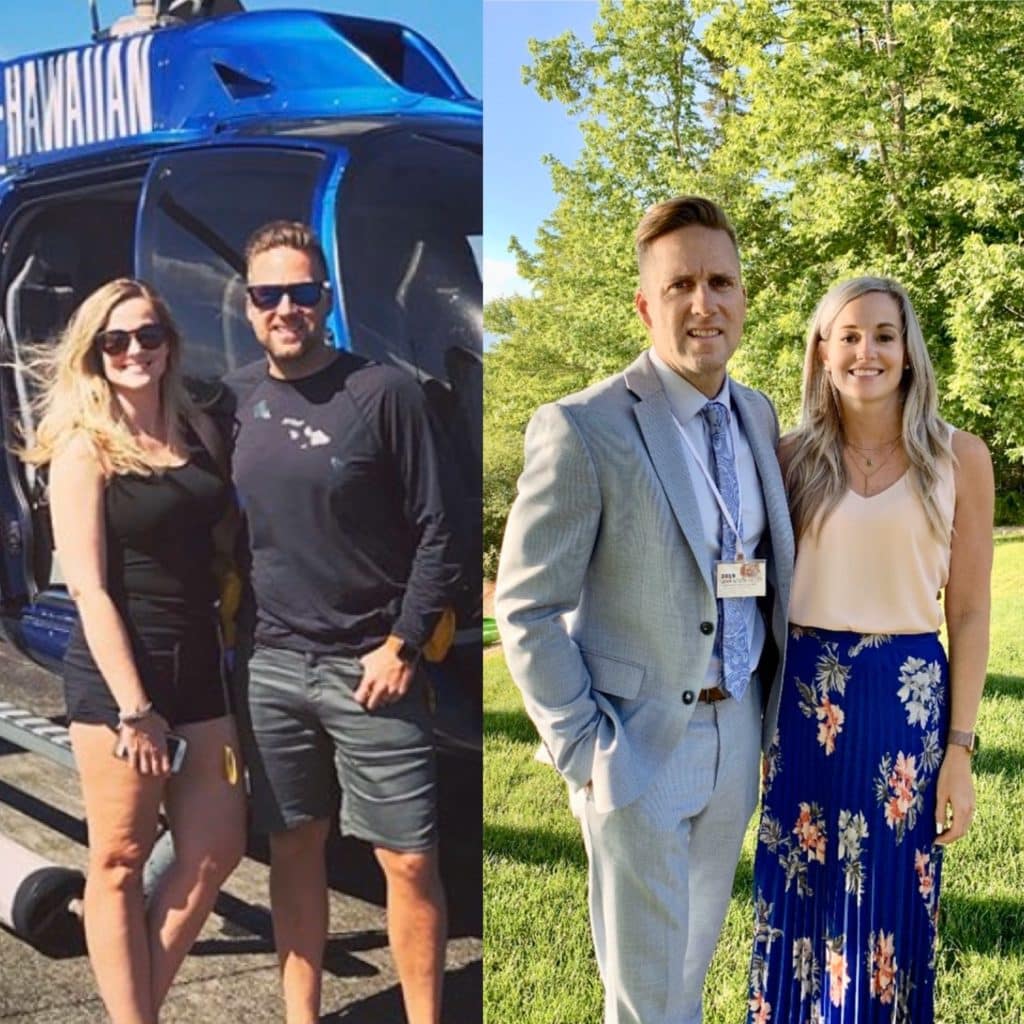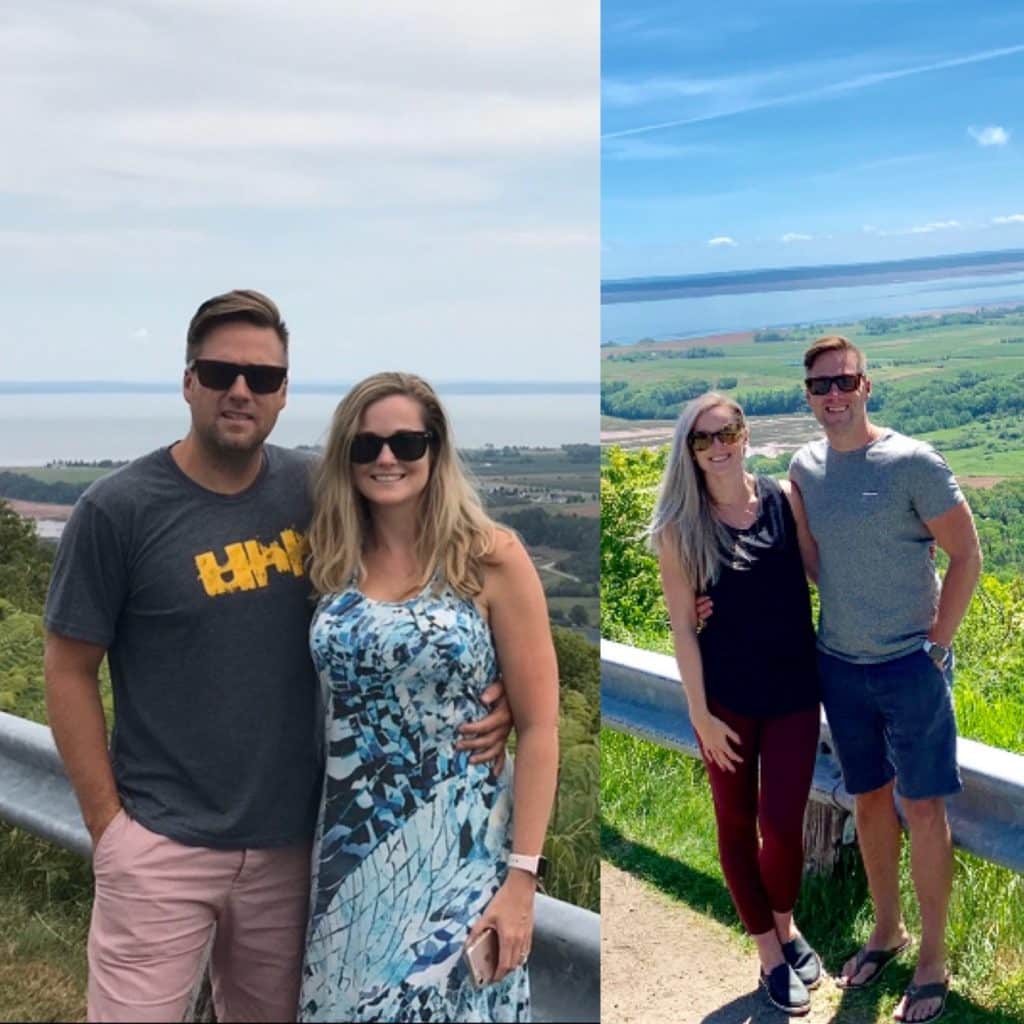Hi I’m Krissy. Let me give you a little bit of background first: I always had an interest in health from the time I was young when I worked as a lifeguard, swam, and was very active. I originally wanted to become a doctor to help others with their health so my first degree was in Biology.

Starting My Own Private Practice
I discovered the importance of nutrition for health in the last year of my biology degree and took a nutrition course. I fell in love with nutrition science and physiology and decided to go back to school to study nutrition.
I got my Bachelor of Science in Applied Human Nutrition and became registered as a Dietitian in 2009. I was also a certified personal trainer and started my own private practice/private training studio after this, where I worked with clients looking for fat loss and building muscle, as well as fitness athletes.
Normal Diet Not Working
I was always considered healthy, fit, and active. I followed the recommended “balanced diet” with lots of variety and common nutritious foods but had to make modifications due to having IBS, such as cutting out dairy and gluten. I was very conscious of making healthy choices based on the nutrition guidelines I learned in school.
We watched "Vegucated" and "Earthlings" and like many others I was terrified into believing animal products were bad for long-term health.
Going Vegan With My Husband
My husband Dwayne and I love learning about health, so one day, he started watching the documentary “Forks Over Knives” and decided he wanted to give a plant-based diet a try. I was not convinced at first because a plant-based diet was not a common practice when I studied nutrition, and I wanted to be objective.
Then we watched “Vegucated” and “Earthlings,” and like many others, I was terrified into believing animal products were bad for long-term health. I did some research at that time based on the resources provided in these documentaries and decided to join my husband.
I didn’t realize at the time how one-sided this research was, however. I took a course in plant-based nutrition and was determined to prove it was possible to thrive on a vegan diet.
The Health Decline
I felt great in my first year as a vegan. We now know this as the “vegan honeymoon phase.” Maybe it’s because I thought I was doing the best thing for my health, the environment, and the animals. But it was after my first year that my health started to decline.
Issues On The Vegan Diet
I discovered I had low iron and vitamin D. I also developed chronic fatigue and chronic pain, was diagnosed with interstitial cystitis started to get skin issues and eczema patches for the first time in my life.
My hormones were out of whack, which was affecting my mood and cycles, my digestion was awful even though I wasn’t consuming gluten, and I soaked everything, and I developed anxiety and mild depression. I also slowly started to gain weight when I had never struggled with my weight in the past.

The Wrong Solution
I started to see a naturopath who prescribed me natural supplements in addition to the iron and vitamin D I was now taking. I also took B12, a multivitamin, and plant-based omega-3 oil, all while following a balanced whole food plant-based diet.
Of course, all of the vegans tell me, “I didn’t do it right,” but if anyone researched hard enough on how to, it was me! After all, I was determined to make it work because I was also coaching vegan clients and doing a whole business around plant-based diets and challenges. I was known as an expert in the industry and had a big social media following, so of course, I wanted to make this work.
Trying All Kinds Of Approaches
I didn’t eat processed vegan foods or junk. I ate a lot of avocados, chickpeas, lentils, vegetables, low-sugar fruits, nuts and seeds, gluten-free whole grains, coconut oil, and nutritional yeast, and drank only water and tea. I did not restrict calories, and I prepared all of my meals at home.
I also tried a variety of different eating protocols, including high carb, low fat, lower carb higher fat. I tried supplementing with pea and rice protein in my green smoothie. I even used a vegan coach to help me. I felt like I was constantly eating in order to make sure I was meeting my needs.
Including Some Animal Products
It was after my 2nd year as a vegan that my naturopath suggested I add in some animal products, so I tried adding eggs back in and did this for another year, then tried adding fish back in a did this for another year, and finally dairy back in for my 3rd year as a vegetarian.
So just to be clear, I was vegan for two years and vegetarian for three more for five years total. At this point, I was still supplementing and eating vegan meals weekly because I still believed it was the healthiest choice, and I was determined to go back to veganism after my deficiencies resolved.
Life Got Hard
Unfortunately, they did not, and my symptoms kept getting worse and worse to the point I didn’t want to get out of bed in the morning. I couldn’t work out anymore, and I had to stop coaching clients during this time because I didn’t know how I was going to help others if I couldn’t help myself.
I've now been carnivore since May 2019 and feel like it's the easiest WOE I've ever followed. I have zero cravings and am happy with eating fatty ribeyes every night.
A Taste Of Meat
One summer evening two years ago, Dwayne was grilling burgers (he only lasted six weeks as a vegan, by the way), and I had the overwhelming feeling to eat one for the first time in years, so I did.
I felt so amazing afterward and had so much energy I decided to add meat back into my diet because I knew my body was telling me something. It only took a few months for my iron levels to shoot up, and I stopped supplementing. My digestion also got a lot better.
Getting Better On Keto
While many of my symptoms had improved once I added meat back into my diet, I was diagnosed with fibromyalgia and interstitial cystitis after seeking answers and treatment from literally every alternative health practitioner out there.
I did several elimination diets after getting my diagnosis and kept discovering more and more triggers that would flare up my symptoms. We have done keto diets in the past, and I was determined to lose the 30lbs I had slowly put on over the past few years, so in January last year, I decided to try a clean keto diet with intermittent fasting (basically fatty meat & veggies).
After three months, my symptoms started to get better (mainly my energy), and I lost 20 lbs.
Following My Crazy Husband (Again)
During this time, Dwayne started doing the Carnivore diet, and I thought he was nuts. He kept sending me videos and research, though, and told me it was basically the most extreme (and accurate) elimination diet out there.
I watched him do it for a few months while I kept eating my veggies, and he was seeing amazing results. I decided I couldn’t say anything against it until I tried it myself and had the goal of doing it for one month as an elimination diet and adding foods back in.
Rapid Changes
Within a few weeks, my brain fog totally went away, my stomach was no longer bloated, and I had amazing energy. After the month, my chronic pain was 95% gone, and my eczema disappeared.
I did try to add foods back in one at a time, starting with avocados and then sauerkraut and my homemade sugar-free coconut yogurt but all of my symptoms came back.
I was feeling so good on Carnivore that I decided to keep doing it until I felt like it was time to play around again. I lost ten more lbs by the time summer came and looked and felt ten years younger.
I’ve tried playing around with adding some things back in, like blueberries and some other low-sugar fruits and vegetables here and there, but symptoms always come back.
I’ve now been Carnivore since May 2019 and feel like it’s the easiest WOE I’ve ever followed. I have zero cravings and am happy with eating fatty ribeyes every night.
Dwayne and I have joined forces and started a social media account called @ourinfinitehealth dedicated to helping others interested in the carnivore WOE. Follow us for free content for us and other successful carnivores.
All Of My Benefits In A Row
- Fibromyalgia and chronic pain symptoms are 95% gone (I still have a little chronic neck pain)
- Chronic fatigue gone
- Interstitial cystitis gone
- Eczema gone
- IBS gone
- Anxiety & depression gone
- Stress levels and mood stabilized
- Hormones (cycles) balanced
- Food cravings & addictions gone
- Body weight & fat stabilized (lost 20 lbs and at my happy spot)
- Able to workout again

As someone who saw the negative effects of making more plant-based choices first hand I just could not recommend the new food guide that prioritized carbohydrates and does not emphasize the importance of fat or animal foods.
Getting To Know Our History
In our extensive research of the keto and carnivore WOE, we’ve learned a lot about anti-nutrients and their role in chronic inflammation and autoimmune conditions. I was also shocked to learn about the history of nutrition recommendations by following the research of Nina Teicolz & Gary Taubes and how there is a huge plant-based agenda behind our current recommendations from listening to the experience of Gary Fettke and Tim Noakes.
As someone who saw the negative effects of making more plant-based choices first hand I just could not recommend the new food guide that prioritized carbohydrates and does not emphasize the importance of fat or animal foods.
Resigning As A Dietitian
I also felt very limited in sharing my story as a dietitian in fear of getting reprimanded even though a high saturated fat keto and Carnivore diet has literally changed my and Dwayne’s lives and reversed diseases in many others.
I wasn’t currently practicing as a dietitian anyway and didn’t feel like my registration was serving me anymore, so I decided to resign. After all, I’ve still had ten years of nutritional coaching experience with clients, and all of my knowledge or my nutrition degree couldn’t be taken away.
Weird Stuff I Was Taught As A Dietitian
Looking back, there were so many things I didn’t understand. I remember doing a clinical case study in school, and I was marked down for the meal plan I made for my patient because it was “too healthy” in fear that he wouldn’t comply. This patient was sick and in the hospital with a serious condition clearly caused by a poor diet.
Of course, I didn’t want to question my instructor, though, because she was the “expert.” My father, a type 2 diabetic, was in the hospital for a month recently, and they kept serving him juice and high-carbohydrate foods even though he expressed his concern.
I understand that we can’t expect people to change overnight, but it doesn’t help when we mislead people into believing their comfort foods are healthy and even serve them in the hospital.
I understand that we can't expect people to change overnight but it doesn't help when we mislead people into believing their comfort foods are healthy and even serve them in the hospital.
Moderation, Actually Extreme
Instead, “a balanced diet” is always promoted, and ‘everything in moderation,’ but it is the most confusing term for people. It basically teaches people they can have anything they want as long as it’s not all the time.
But does that mean you can still have it daily? What if some of us need to be a little more extreme with our diets because we have extreme conditions and don’t want to resort to something even more extreme like taking long-term medication, surgery, or suffering in misery?
Government Ignoring The Science
If you look at Health Canada’s guidelines, even artificial sweeteners are still considered safe, and we are still taught to limit saturated fats even though the new research shows there actually isn’t enough science to prove this.
Nutrition science is largely based on epidemiological studies (food records), which we know are unreliable, but Dieticians cannot recommend anything that does not have any studies backing it, so it’s very difficult to go against the grain.
I’ve always been very objective in my beliefs and would rather experience for myself than wait for new guidelines to come out that I now know are driven by a corporate agenda or for research years later.
Results are not typical. All viewers of this content, especially those taking prescription or over-the-counter medications, should consult their physicians before beginning any nutrition, supplement or lifestyle program.

3 thoughts on “Krissy eliminated chronic pain on carnivore diet”
This sounds so much like my symptoms. Specifically the fibro and IC! Thank you for sharing your story!
Woow
What about constipation? That is my biggest concern as it’s been a huge issue my whole life. The thought of getting MORE constipated stops me in my tracks. Any thoughts?